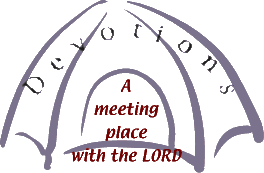 Catching the Excitement of Personal Devotions
Catching the Excitement of Personal Devotions
& Quiet Times
Paul J. Bucknell
Exodus 33:7-11
Before we understand how to have good devotions and quiet times, let us first catch a greater excitement for devotions. Most Christians consider their quiet time as something to be endured rather than something to look forward to. Listen to this quote from an honest pastor.
|
Most of my life I've read the Bible more like a Pharisee than a New Testament Christian. Most of my life I've made the mistake of believing God for too little. For the rest of my life, if I have to make a mistake, it's going to be believing God for too much. But how can you believe an omnipresent, omniscient, omnipotent God for too much, especially when he himself says, "everything is possible for him who believes" (Mark 9:23)? (1) |
We complain about the Pharisees but never can be objective enough to see that the reason Jesus talks to them is to train the Christian to fight a certain tendency they face in their lives. In essence, the problem is doing things with ones mind but not ones heart. In a sense it is a form of unbelief based on pride. Perhaps we need to explain a bit more here.
Bad experience shapes bad theology.
We pointed out that many Christians have come to associate their devotions with a rather dull time. They continue them because they are suppose to or perhaps for a more devious reason. 'I need to look like a good Christian.' They have come to accept a wrong notion of what their meeting with God will be like. They in turn adjust their thoughts of God, themselves and others. Bad experience shapes bad theology.
Purpose of Devotions
Just think about it for a moment. What is it like for people when they meet God in the scriptures? Every time a person meets with God, we find a very significant event occurring. We are not suggesting that each time will be as dramatic as Isaiah in Isaiah 6 or Moses on top of Mount Sinai. Instead, it is more like Moses when he went into the tent and regularly met with God.
7-8 Now Moses used to take the tent and pitch it outside the camp, a good distance from the camp, and he called it the tent of meeting. And it came about, that everyone who sought the LORD would go out to the tent of meeting which was outside the camp. And it came about, whenever Moses went out to the tent, that all the people would arise and stand, each at the entrance of his tent, and gaze after Moses until he entered the tent.
9-10 And it came about, whenever Moses entered the tent, the pillar of cloud would descend and stand at the entrance of the tent; and the LORD would speak with Moses. When all the people saw the pillar of cloud standing at the entrance of the tent, all the people would arise and worship, each at the entrance of his tent.
11 Thus the LORD used to speak to Moses face to face, just as a man speaks to his friend. When Moses returned to the camp, his servant Joshua, the son of Nun, a young man, would not depart from the tent.
(Exodus 33:7-11).
Our big question will be, "How do we know that what Moses experienced is normal for the life of every believer?!" That is an excellent question. We will get to that in a moment. But let us not be so hasty with our negative and challenging thoughts. Remember we are not trying to put discernment from our minds but doubt and suspicion.
 Let us instead treat this passage as a text that we might by chance read in the morning. What might God say to you from this passage? Let us draw five conclusions from this passage Exodus 33:7-11.
Let us instead treat this passage as a text that we might by chance read in the morning. What might God say to you from this passage? Let us draw five conclusions from this passage Exodus 33:7-11.
1) Moses met regularly with God.
"Whenever Moses went out to the tent"
He described this as a 'tent of meeting.' In other words, he would meet God there. He would meet Him so regularly there, that he could describe it as 'whenever.' It would be silly to call a meeting room by that name if it never had meetings in it!. There was a pattern and a place to meet God.
Application.
God can meet with people closely even in the Old Testament Would God meet with me this way? How often would He meet me? Why would He meet me? What would we do if we did meet?
2) Outside the camp.
"Outside the camp, a good distance from the camp"
There is too much sin where the people live. There would be too much to distract Moses from God if He was in the midst of the people. God met with him outside the camp.
Application
God wants to meet with me alone. Privately. He especially doesn't want me to bring the dust of the world into my meeting with Him. The whole reason to meet with Him is to get away from the world with all its sin. I need to live with a cleansed conscience. God doesn't want me to get close to Him with my sin. I need to regularly turn from any sin in my life.
3) Moses meets God.
"Whenever Moses entered the tent, the pillar of cloud would descend"
Moses was not alone. As Moses entered the tent, God approached. This physical display of God's presence in this way was typical during the journey out of Egypt, though it is not today. This special manifestation during the wilderness period disappeared when they got to the Promised Land along with the manna.
Application
There is not much sense having a meeting with God (devotions) if God is not there. Why am I not very conscious of Him some times? Is it my doubt? My sin? Or just my stupid ignorance? Have I had devotions so long and never thought God's presence to be the most critical aspect of that time?!
4) God talked with Moses.
"The LORD would speak with Moses."
The LORD spoke with Moses. Yahweh, the LORD, speaks with Moses. It doesn't say Moses talked with God but that is common and assumed. God's words, however, make it very special. Many people pray one way prayers but not many people actually hear God speak. Many believe He doesn't speak today.
Application
I want God to speak with me. It might be scary or delightful, but what is the sense living if God would be quiet? What wisdom would I have if He kept quiet? Who else do I have? I want to be close to Him and Him with me. I greatly need Him to be my God.
5) People's response.
"When all the people saw the pillar of cloud"
Only Moses would experience this meeting with God, but it would cause great interest and worship in those around him. Joshua, his servant, actually stayed there at the tent. The people worshiped.
Application
I want to meet with God each day. I want to hear Him. Like Solomon's prayer, may His presence so influence me that those around me would grow in their love and knowledge of God's glory! May God raise up holy leaders around me through my times together with God.
Summary
Do you find yourself being drawn to wanting to meet with God through this passage? Could you put your critical questions aside for a moment to enjoy the delights of meeting with God?
My soul longed and even yearned for the courts of the LORD;
My heart and my flesh sing for joy to the living God.
(Psalms 84:2, NASB).
However, we do need to address the question whether this is something to be expected under the New Covenant. In other words, are Christians to expect to meet God this way?
We saw the desire of God to meet at least with this one person. He could do it and not die. The meeting came to be so regular that the place had a name on its own. Moses didn't go there to be by himself but to be with God. Why is it that I so often have devotions without thinking about meeting God? Am I content to ritual but not real life?
Let's see what the New Testament says about meeting with God. Is Moses' experience really for us as Christians? Next
| Introduction | Shaping | Struggling | Excited | Meeting God | Prayer | God's Word | Preparations |
| Expectations | Communing | Burnout | Questions | Study Questions | Testimony | Mueller |
BFF Homepage | Top | Index | Back | Study sheet | Next
Biblical Foundations for Freedom
By Paul J. Bucknell